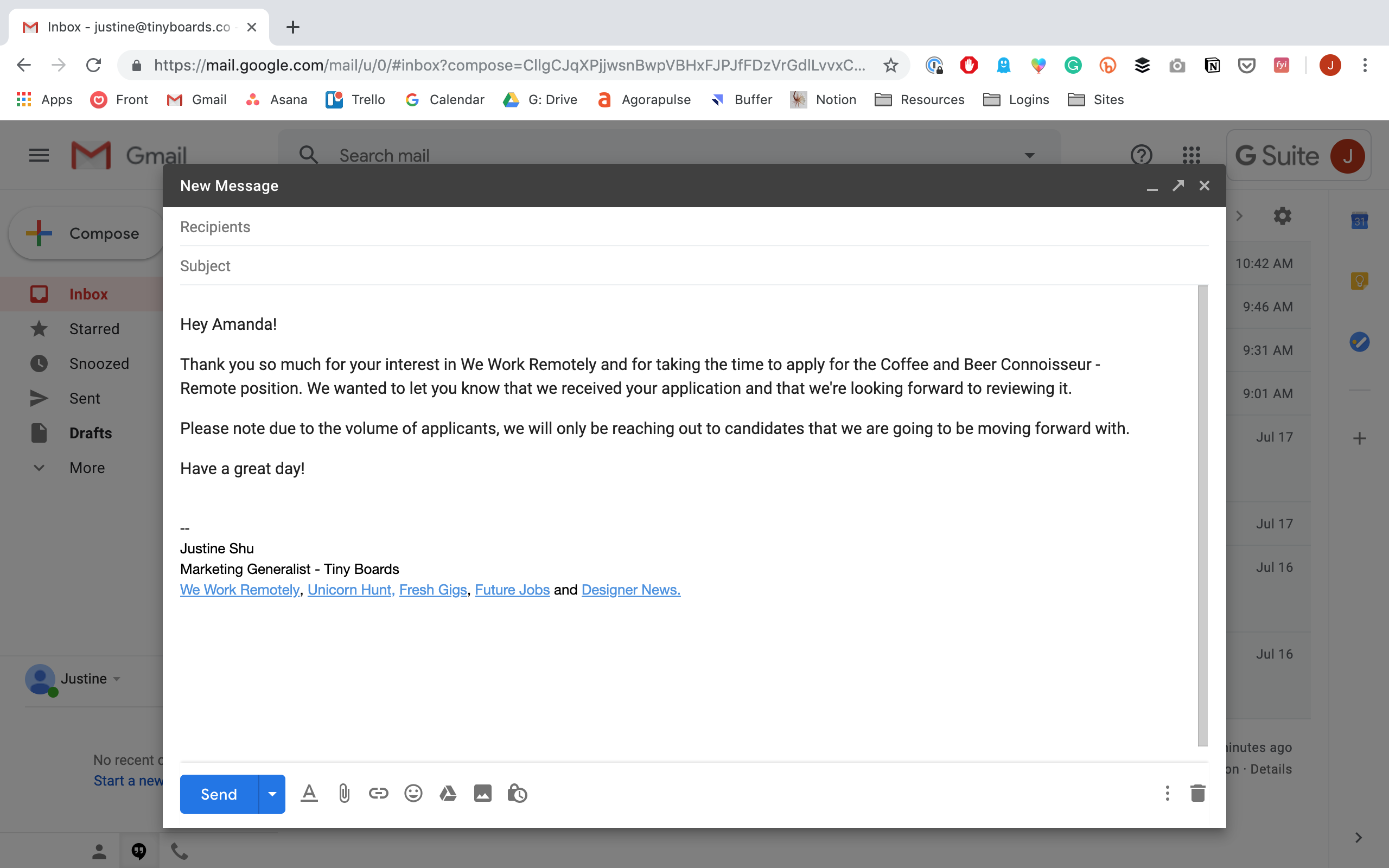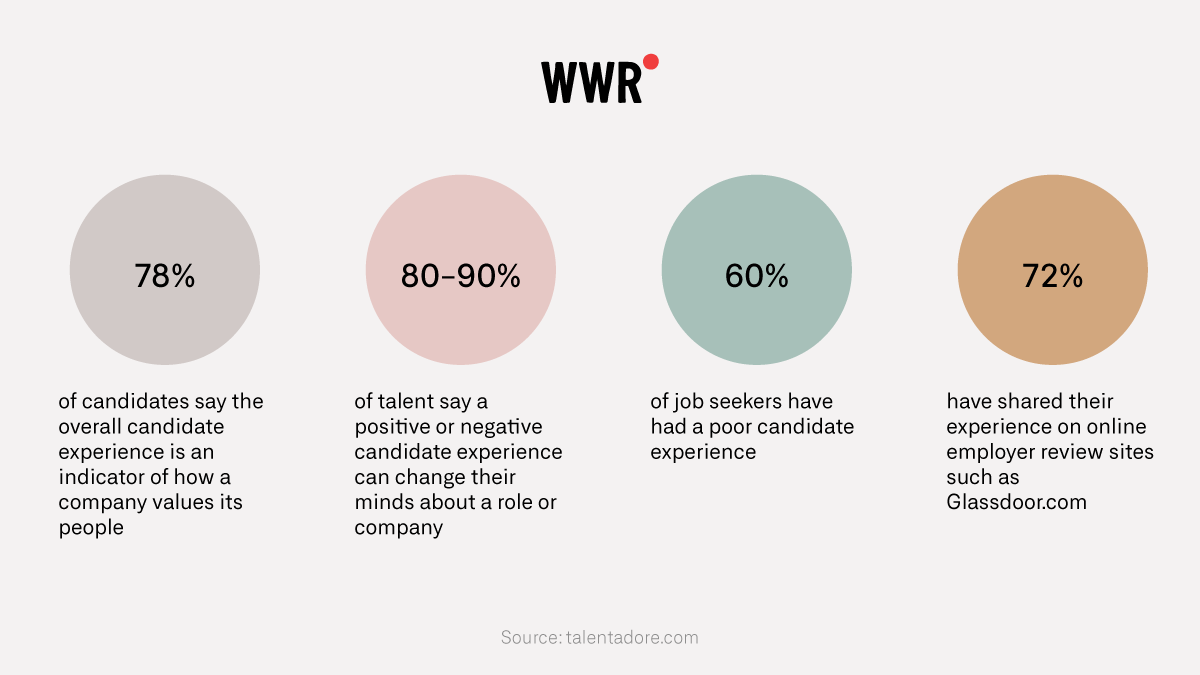Telling a candidate they didn’t get the job is arguably one of the hardest things to do as a hiring/recruiting manager. Sure, it’s just “part of the business” or “part of the job”, but aside from he-who-must-not-be-named, who actually wants to be the bearer of bad news and potentially let someone down?

Rejecting candidates ineffectively also impacts your company’s reputation and overall brand, ultimately making your talent pool smaller and preventing you from improving the overall interviewing experience for your candidates.
Why is Improving the Candidate Experience Important?
Candidates who don’t quite check all of the boxes for a specific role could be a better match for future job openings. Maintaining relationships with this group of talent can improve some of the most important aspects of hiring: time to hire, cost per hire, and quality of hire.
Once you turn a candidate away, the experience doesn’t just presto disappear for them. No, they’ll likely turn to their own individual communities to relay their experience and potentially share with wider online communities as well.
Each of these candidates you don't hire can either help build your brand or diminish it; this is yet another avenue for you as a company to present yourself positively to the world. Each person who leaves with a bad taste in their mouth has a network of people that they probably share their experience with. Not hiring someone is actually an opportunity to grow your brand by taking a difficult conversation and transforming it into a positive experience.
Humanizing the Candidate Experience - Here’s How
Set applicants up with a positive experience right from the start.
Work with Empathy
It takes a mixture of empathy, good communication skills, and strong boundaries to convey bad news. Most of us have been on the side of being rejected from a position. Even if it’s one that you didn’t really want, not getting a job can feel like a swift kick in the gut--I mean, our livelihood literally depends on having a gig of some sort. Being empathetic to an applicant is necessary for that very reason, but delivering the news with strong boundaries is just as important. It’s a balance of knowing that communicating bad news is part of the business and allowing for humanization to be present as well.
It takes a mixture of empathy, good communication skills, and strong boundaries to convey bad news. Most of us have been on the side of being rejected from a position. Even if it’s one that you didn’t really want, not getting a job can feel like a swift kick in the gut--I mean, our livelihood literally depends on having a gig of some sort. Being empathetic to an applicant is necessary for that very reason, but delivering the news with strong boundaries is just as important. It’s a balance of knowing that communicating bad news is part of the business and allowing for humanization to be present as well.
Give Acknowledgement and Closure
Applicants spend considerable time and energy updating their resumes, writing cover letters, and in most remote hiring experiences, working on test projects/tasks. They deserve the consideration of a (prompt) reply from you.
There are a few different audience pools here:
- All applicants
- Candidates who only made it to the first few stages
- Candidates who made it to the final round
If your company doesn’t use a hiring software, setting up canned email responses at pertinent stages can make all of the difference. We’d recommend setting up canned responses to everyone who sends their application in and again to everyone who applied when you do make the hire. Audiences two and three should get some personal feedback.

Remember: no communication is still communication. Even if it’s a generic message, providing candidates with some sort of acknowledgment influences the candidate’s view of your company. If you’re concerned the generic message may come off as cold, this would be a great opportunity to work with the branding/marketing manager to inject the copy with your company’s voice. Don’t be afraid to make it fun!
Provide Feedback
Reach out to whoever makes it to the last few rounds but didn’t make the final cut with a specific reason. With the amount of time and energy it takes to apply for jobs, the candidates deserve it. 94% of job seekers want to receive interview feedback but only 41% have received it before. [*] Building goodwill with all applicants - no matter how far they get in the process - is crucial because these people still could be your future candidates; they’re 4x more likely to consider your company for a future opportunity when you offer constructive feedback. [*]

Don’t Take It For Granted
It should be flattering that hundreds of people want to be a part of something you and your team created–don’t take that for granted! Taking the time to thank the people who want to be apart of what you’re doing is worthwhile, in our books.
Which Medium Should You Use?
There are of course a few different ways to let the candidate know, but no matter what the medium is, here are a couple of considerations:
- You’re not rejecting the candidate as an individual human (also, refraining from using the word ‘rejected’ is probably a good idea!).
- Be conscious of the language you’re using so that the applicant can’t misconstrue them or find evidence of unlawful discrimination.
- Be prompt. 69% of candidates would like to see employer response time improved[*].
There are a lot of strong opinions that rejection should be communicated via phone or video. We don’t disagree. However, hiring remote comes with a larger application volume than normal and remote culture is based on communicating online and asynchronous communication.
So, we’ll leave you this. Whether you’re using email, phone, or video to communicate, remember to:
- Deliver information in a prompt manner
- Humanize the candidate experience with empathy and providing closure
- Express your gratitude
- Deliver the news with feedback
- Keep in touch and ask for feedback

